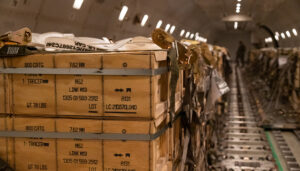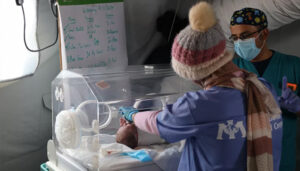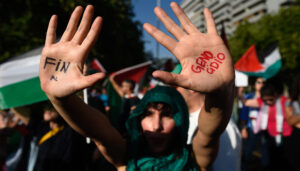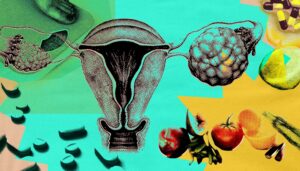 Language of Baklava: A Memoir, Diana Abu-Jaber, Anchor Books, New York, 2005.
Language of Baklava: A Memoir, Diana Abu-Jaber, Anchor Books, New York, 2005.
Written by Lee S. Tesdell
Diana Abu-Jaber, the author of the Language of Baklava, has confirmed something I have suspected for some time; food, in immigrant and refugee communities, can become food-language, a connection with back home:
What is food-language? It spans the continents. It might be the growing, acquisition, or the preparation of the ingredients. It might be the culinary utensils and the company you keep when you are preparing the food. It is the sounds of the original language used to discuss food and the smells and tastes around the table as you are partaking; food language is powerful. Sometimes there are no words for the food or dish in the host culture. Sometimes the ingredients have to be altered to substitute for one that does not exist or is difficult to obtain.
At Palestine Lutheran Church in rural Huxley, Iowa, 152 years after first arriving on the Iowa prairie, we descendants of Norwegians still gather each November to eat kumla, gelatinous balls of shredded potato, boiled with ham, through which we remember our Norwegian peasant roots.
My Bosnian friends roast whole lambs at important family occasions here in Des Moines, Iowa and grow their favorite Bosnian potatoes, peppers, tomatoes, and onions in their backyards. They re-settled in Iowa after the Bosnian tragedy of 1992-1995.
Abu-Jaber has done a great service to all these immigrants who have remained connected with “back home” through food language.
I learned about food language first hand. My wife, who was Palestinian by birth and Jordanian by nationality, had favorite dishes that, I believe, “transported” her home even though she was living half a world away. She prepared these meals for us at home or for guests. We would grow some of the ingredients in our own garden. Some things she had to substitute locally available ingredients for. Others we could find and adapt like grape leaves (we found that local wild grape leaves worked fine) and the spearmint that we grew on the west side of the house worked fine for naanaa (mint). We got mouloukhiyya seed from back home and grew our own. We began raising our own sheep for the lamb.
Those dishes included okra stew, bamia; Jew’s mallow, mouloukhiyya (prepared the Palestinian way, soupy, not the Syrian way, with dry leaves); stuffed grape leaves, waraq einab; cabbage rolls, malfouf; stuffed zucchini, kousa mahshe; Arabic bread dipped in olive oil and wild thyme, zeit w’ zaatar and tea with mint leaves, shay b’naanaa.
Diana Abu-Jaber is the daughter of a Jordanian father and American mother. She grew up in Syracuse, New York, and lived for some time in Jordan. Abu-Jaber’s first two novels are Arabian Jazz (1993) and Crescent (2003). She has come out with a new book, Origin, this year. Abu-Jaber is currently on the creative writing faculty at Portland State University, in Portland, Oregon.
In Arabian Jazz, I sensed that Abu-Jaber was not connecting genuinely with her Jordanian roots though it was a good story. She did a reading at Big Table Books in Ames, Iowa, some years ago. Her autograph in my copy of her book from July 3, 1993, reads in part “For Lee, A fellow cultural worker!” This leads me to believe that she has always taken seriously the task of writing about the meeting point of her two native cultures.
The current book, I think, is much more readable because it is more clearly autobiographical and “true” to the culture. In Arabian Jazz, Abu-Jaber doesn’t quite commit to her Jordanian roots. In Baklava, she does so very clearly.
So what exactly does Abu-Jaber’s food language consist of? Abu-Jaber uses humor and food to tell her story. Her recipes, sprinkled throughout the chapters, have titles that are appropriate to that chapter. Her recipes include Mad Genius Knaffea (p. 120), Perfectly Tender Bamia (p. 176), Poetic Baklava: for when you need to serenade someone (p. 192-193), Cowboy Kibbe (p. 200-201), A Perfect Glass of Araq: for making the perfect toast (p. 210), Homecoming Fatteh (p. 225), Innuendo Squash (p. 249), and Garlic-Stuffed Roasted Luxurious Leg of Lamb (p. 283).
Abu-Jaber’s food language clearly makes the Syracuse-Jordanian connection for Diana’s father Ghassan (Bud) Abu-Jaber. It did the same for me and may do the same for you.
Lee S. Tesdell is a associate professor of English(technical communication) at Minnesota State University Mankato. Contact him here.










